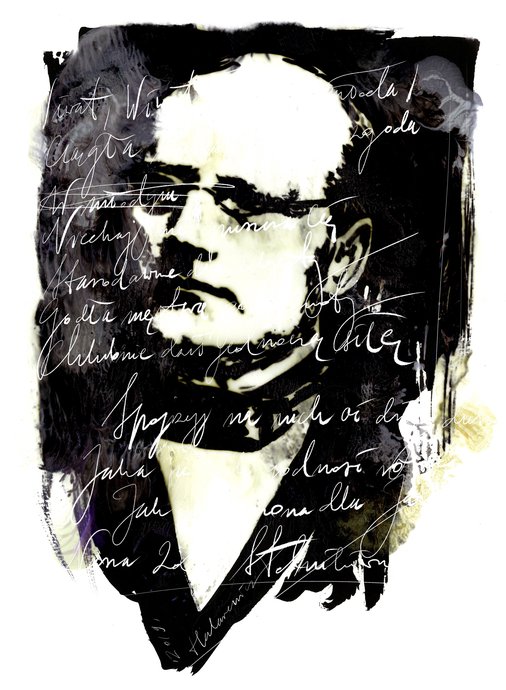Stanisław Moniuszko (1819-1872)
Stanisław Moniuszko (1819–1872) was a Polish composer widely regarded today as the creator of Polish national opera.
He was born in 1819 in Ubiel in present-day Belarus. He began learning music with his mother as a teacher. When the family moved to Minsk, he studied with Dominik Dziewanowski, then trained with August Freyer in Warsaw. Just before the November Uprising (1830), the family went back to Ubiel. In 1836 Moniuszko left again for Berlin to study music with Carl Rungenhagen, the head of the city’s Singakademie.
Having completed his studies in 1840, Moniuszko retuned to Poland. He married Aleksandra Müllerówna, whom he had met a few years back, and settled in Vilnius, earning a living as organist at Saint John’s church. Simultaniously, he was involved in artistic projects meant to animate the city’s music life. He organised performances of his operas and operettas in private salons. In 1847, under the influence of Włodzimierz Wolski, a man of letters from Warsaw, Moniuszko wrote the two-act opera Halka, which was performed in a concert version in Vilnius, yet enjoyed merely local success. However, the composer’s contacts with Warsaw’s bourgeoisie and aristocracy, e.g. Józef Sikorski, editor-in-chief of the music magazine ‘Ruch Muzyczny’, and General Ignacy Abramowicz, director of the state theatre administration, were to bring a significant shift in Moniuszko’s life and career.
The turning point came in 1858, when a new, four-act, version of Halka was given its debut. Soon afterwards, General Abramowicz appointed Moniuszko Conductor of Polish Operas at Warsaw’s Teatr Wielki. From that moment on, Moniuszko would present a new opera each subsequent year. His Flis (The Raftsman) was give a debut at the end of 1858, Hrabina (The Countess) premiered in 1860, and Verbum Nobile opened in 1861. As tensions were growing in Warsaw on the onset of the January Uprising (1863), the premiere of Moniuszko’s The Haunted Manor was delayed. Considered Moniuszko greatest achievement along with Halka, it was given a debut only in 1865. Before he died, Moniuszko had managed to complete Paria and Beata, leaving a few other works unfinished.
Having settled in Warsaw, Moniuszko took up a post at the newly-opened Institute of Music, teaching harmony and counterpoint. Moniuszko’s large family (Stanisław and Aleksandra had ten children) lived close to the Teatr Wielki: today you can see plaques commemorating the composer on the walls of buildings on Mazowiecka Street and in the Old Town. Stanisław Moniuszko went down in history as ‘the father of Polish opera’ and a leading Polish composer of art songs. He compiled a collection of over two hundred songs called Śpiewnik domowy (Songbook for Home Use), which is a valuable counterpoint to the Romantic legacy of Franz Schubert and Robert Schumann. The most popular song in the collection is Prząśniczka.
Stanisław Moniuszko died of heart failure on 4 June 1872 in Warsaw and was buried in the Powązki Cemetery. A museum devoted to him was established in Ubiel in the 1980s. Most of his works are held at the Library of the Warsaw Music Society, which Moniuszko co-founded.
Widely recognised as an opera and art song composer, Moniuszko also wrote chamber, ballet, piano, and organ music.
On 5 May Stanisław Moniszko is born in Ubel near Minsk as an only child to Czesław and Elżbieta née Madżarska, and a grandchild to Ewa and Stanisław Moniuszko.
At 5 years of age little Stanisław starts taking music lessons with his mother and reading his first book: Julian Ursyn Niemcewicz's rhymed history of Poland, Śpiewy historyczne (History Songs).
Stanisław takes formal lessons at his Uncle Korsak's estate together with his two cousins, Albina and Edmund. Their tutor is Jakub Jagiełło, who studied with Adam Mickiewicz in Vilnius.
Czesław Moniuszko moves to Warsaw with his family to provide his son and the Korsak children with better educational opportunities. They set up home in the district of Żoliborz.
The family moves to the Staszic Palace on Krakowskie Przedmieście Street. Working with private tutors, Stanisław prepares to start the fourth year of the Piarist School. In parallel, he studies music with young organist August Freyer. In Warsaw Moniuszko develops his musical horizons and interests. He comes into contact with folk music, which will be reflected in his compositions in the future.
As Czesław Moniuszko runs into financial troubles, the family moves from Warsaw to Minsk.
Stanisław enrols in a Polish middle school in Minsk. He leaves three years later, having completed year six. Officially, the reason is his poor health, yet the underlying motivation seems to be the facility’s transformation into a Russian school. Stanisław is subsequently home-schooled by his uncle Kazimierz and after the latter’s death he studies on his own.
Moniuszko spends a few months in Vilnius with his paternal uncle Aleksander. Stanisław spends every leisure moment at the opera, listening to Bellini, Mozart, Rossini and Weber. He meets Aleksandra Müller, a young lady one year his junior, and the two are soon engaged to be married.
He leaves for Berlin for three years to study music under Carl Friedrich Rungenhagen, the then director of the Sing-Akademie zu Berlin.
The Berlin-based publisher Bote und Bock releases Moniuszko's Trzy śpiewy (Three Chants) to text by Adam Mickiewicz: Sen (Dream), Niepewność (Uncertainty), Moja pieszczotka (My Sweeting). These are the young composer's first works ever to be published. During his studies in Berlin, he will also write String Quartet in D minor (later dedicated to Józef Elsner), String Quartet in F major F and the operettas: Nocleg w Apeninach (A Night in the Apennines) and Nowy Don Kichot czyli Sto szaleństw (The New Don Quixote, or A Hundred Follies), both set to text by Aleksander Fredro.
Having returned to Vilnius, he marries Aleksandra Müller. The newlyweds move into the Müllers' house at ul. Niemiecka 3. Moniuszko takes up the post of organist at Saint John's Church, which owns the most beautiful organ in Lithuania. Soon, Moniuszko will start giving concerts at the church. He will also write two two-act operettas to text by Oskar Milewski: Ideał (Ideal) and Karmaniol czyli Francuzi lubią żartować (Carmagnole, or The French Like Joking).
He leaves for St. Petersburg for the first time, hoping to obtain a position matching his artistic aspirations. His fails in his efforts and is forced to go back to Vilnius, where he continues to work as an organist and private music teacher. He befriends Władysław Syrokomla, Aleksander Walicki, Edward Ilcewicz and Alfred Römer. He writes the opera Sielanka (Idyll) with a libretto by Wincenty Marcinkiewicz and the one-act operetta Loteria (The Lottery) to text by Milewski.
Moniuszko's Songbook for Home Use No. 1 is released, including songs such as Świtezianka (The Nymph of Lake Switez) to text by Mickiewicz, Panicz i dziewczyna (The Young Master and The Girl) to text by Odyniec and Dziad i baba (The Old Man and The Old Woman) to text by Kraszewski. Overall, Moniuszko composed around 278 songs, 268 of which were included in his twelve Songbooks for Home Use. Six of the Songbooks were published in the composer's lifetime and six posthumously.
He arrives to Warsaw to discuss the staging of Loteria (The Lottery) with the managers of the Warsaw opera house. The work opens later that year to favourable reviews. While in Warsaw, Moniuszko meets Włodzimierz Wolski, who presents him with the libretto for Halka.
Moniuszko writes the first, two-act version of Halka in Vilnius.
Halka is given its concert debut at the Müllers' hall in Vilnius. Moniuszko writes two cantatas: Milda and Nijoła, both for solo vioces and mixed choir with orchestra to the poem Witoloraudy by Józef Ignacy Kraszewski. He also composes the fantastic overture Bajka (The Fairytale).
Moniuszko travels to St. Petersburg for the second time. The trip turns out to be an artistic and social success. His concerts receive very good reviews and are popular with the audience. The crisis and listeners particularly like his Milda and Bajka (The Fairytale). Moniuszko meets Glinka, Balakirev and Mussorgsky, among others. He dedicates his Bajka to Dargomyzhski. The two will form a deep friendship.
Moniuszko writes the two-act operetta Cyganie (The Gypsies) to text by Franciszek Dionizy Kniaźnin. The work is later renamed Jawnuta after the female protagonist.
Jawnuta is performed during a concert in Vilnius along with Moniuszko's newly composed comic opera Bettly with a libretto by Feliks Schober.
The theatre premiere of the two-act version of Halka featuring professional opera singers is unfavourably received by the audience and critics.
Moniuszko travels to St. Petersburg for the third time. The concert he performs features Bajka (The Fairytale), fragments of Milda and excerpts from the cantata Nijoła.
The Warsaw opera house decides to stage Halka. Wolski makes a range of corrections to the libretto and adds new fragments; Moniuszko writes music for them. Thus, they create the four-act version of Halak. The composer arrives to Warsaw to oversee the premiere.
The new version of Halka is enthusiastically received in Warsaw. As a result of the success, Moniuszko is offered the position of resident conductor with the Warsaw opera house. Thanks to the proceeds from a concert held by Maria Kalergis, Moniuszko can afford a trip to Western Europe. He travels to Paris via Kraków, Berlin, Prague, Dresden, Leipzig, Weimar, Frankfurt, Mainz and Cologne. While in Weimar, he pays two visits to Liszt, who performs two of Moniuszko's compositions.
After his return to Poland, Moniuszko makes a permanent move to Warsaw, where he is appointed the director of the Warsaw Theatre Directorate. He sets up home at Krakowskie Przedmieście 81.
Flis, an opera Moniuszko started writing in Paris, with a libretto by Stanisław Bogusławski, is given its debut.
Composed three years earlier, Moniuszko's three-act opera Hrabina (The Countess) with a libretto by Wolski opens in Warsaw. A satire of French-influenced aristocracy and a praise of Polishness and patriotism, the work is enthusiastically received by the public. Moniuszko is offered the professorship of composition in the newly-opened Music Institute in Warsaw. He refuses 'due to existing engagements'. He writes Verbum nobile, a one-act opera with a libretto by Jan Chęciński.
Verbum nobile opens at the Teatr Wielki. The political situation in Warsaw worsens. Patriotic demonstrations yield first casualties. As a chorus master, Moniuszko takes part in solemn church services. At the end of the year, he leaves for Paris for the second time, where he meets Rossini, Auber, and local intendants. Having returned to Warsaw, he is presented with the libretto for Straszny dwór (The Haunted Manor) by Chęciński.
Moniuszko's Widma (Phantoms) open in Warsaw on the second anniversary of the outbreak of the January uprising. The cantata is a musical setting of selected fragments of Adam Mickiewicz's patriotic poetic drama Dziady (The Forefathers' Eve). Moniuszko joins the Lviv Music Society. The certificate of membership is handed to him during a special ceremony accompanied with a concert which he conducts. He chooses to perform Widma, which – just like in Warsaw – is very well-received by the local audience.
In the autumn Moniuszko conducts the premiere of The Haunted Manor at Warsaw's Teatr Wielki. The audience is enthralled; the outpouring of patriotic emotion turns into a political demonstration. Concerned, the Russian authorities ban the production.
Moniuszko becomes professor of harmony and counterpoint at the Music Institute, Warsaw. He also teaches composing and instrumentation. He significantly expands Alexandre Georges' ballet Monte-Cristo after Aleksandr Dumas' The Count of Monte Cristo. The work will premiere at the Teatr Wielki, Warsaw in Roman Turczynowicz's choreography.
Moniuszko writes Sonety krymskie (The Crimean Sonnets), a cantata for solo voices, chorus and orchestra to text by Adam Mickiewicz.
Halka opens in Prague under Bedřich Smetana. Moniuszko becomes famous as an opera composer across the Slavic countries. He writes Na kwaterunku (In the billets), a one-act ballet, which will premiere at the Teatr Wielki, Warsaw in a choreography by Henryk Meunier.
Paria, Moniuszko's opera with a libretto by Chęciński after Casimir Delavigne's tragedy opens in Warsaw, while Halka is staged in Moscow without the composer's knowledge.
Moniuszko leaves for St. Petersburg for the fourth time, where his Halka opens to rave reviews. In the wake of the success, Grand Duke Konstantin invites Moniuszko to a gala concert his palace.
Together with Adam Münchcheimer Moniuszko writes the ballet Figle szatana (Satan's Tricks aka Devil's Frolics), which will premiere at the Teatr Wielki, Warsaw in a choreography by Virgilius Calori.
Moniuszko writes Pamiętnik do nauki harmonii, a book about musical harmony.
Moniuszko's Beata, a one-act operetta with a libretto by Chęciński, opens at the Teatr Wielki, Warsaw. It is the composer's last finished work. He dies on 4 June 1872. The funeral service turns into one of the largest patriotic demonstrations Warsaw has seen in its history. The composer is laid to rest in the Powązki Cemetery.
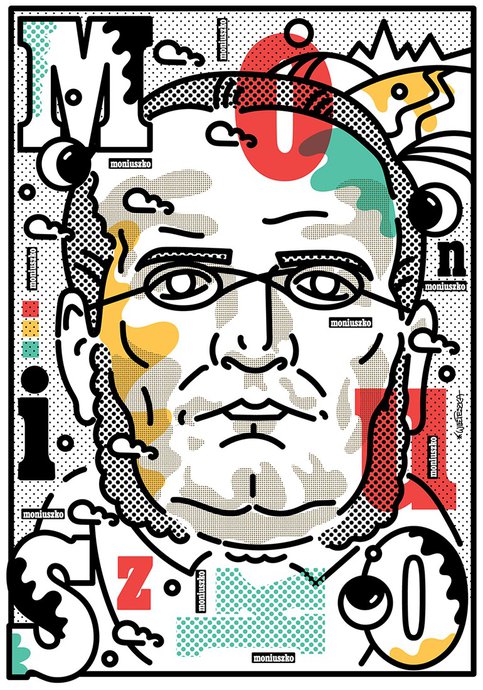
STYCZEŃ - Moniuszko wg Andrzeja Wieteszki
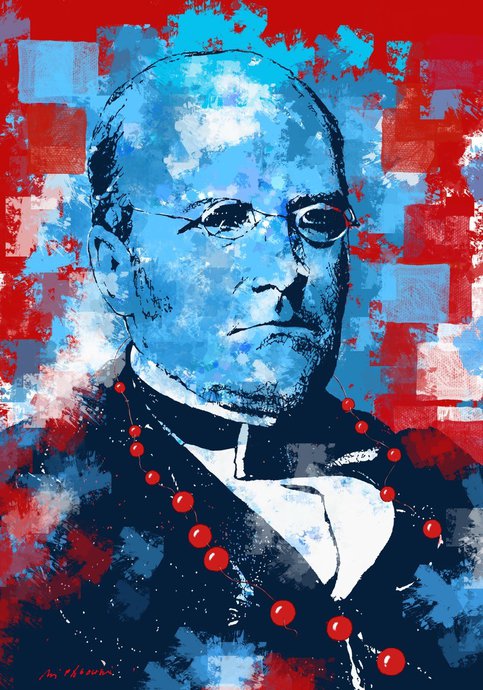
LUTY - Moniuszko wg Andrzeja Pągowskiego
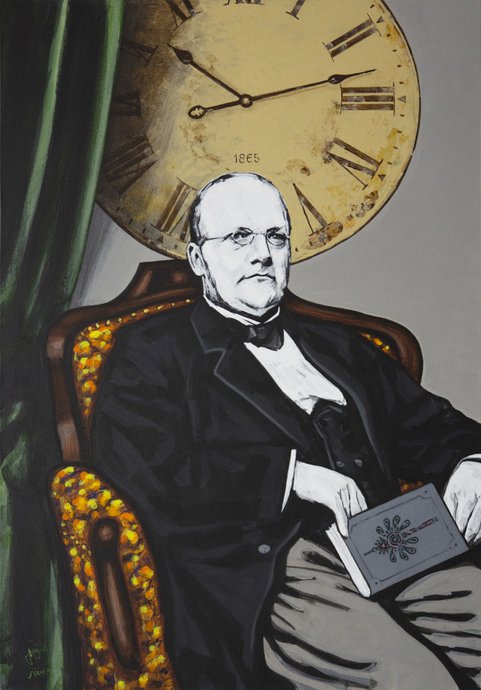
MARZEC - Moniuszko wg Andrzeja Stroki
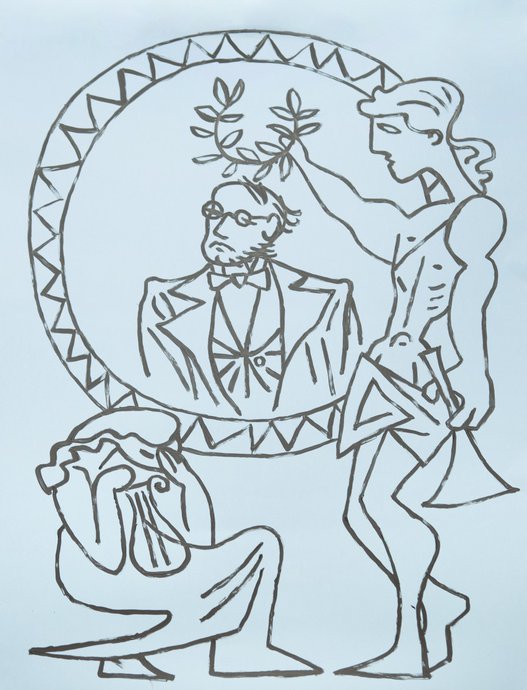
KWIECIEŃ - Moniuszko wg Karola Radziszewskiego
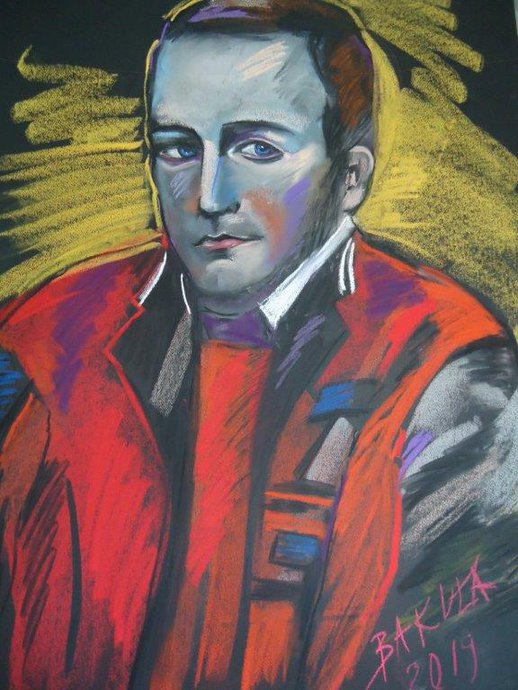
MAJ - Moniuszko wg Hanny Bakuły
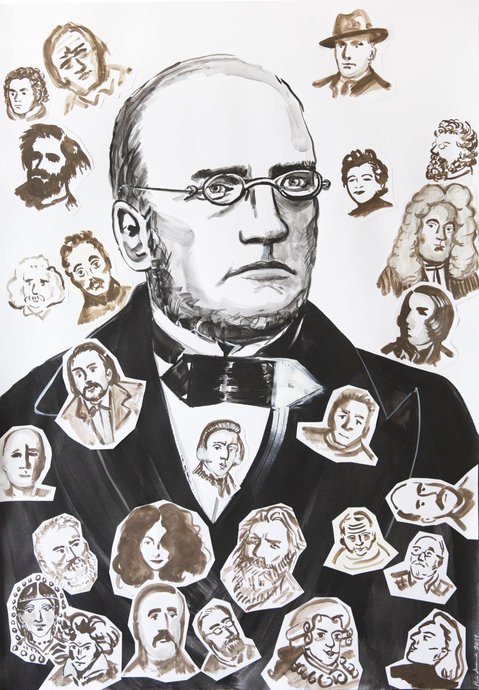
CZERWIEC - Moniuszko wg Poli Dwurnik
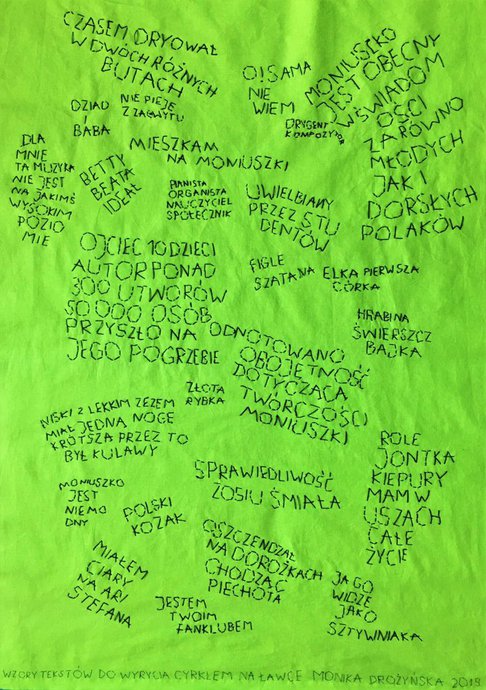
LIPIEC - Moniuszko wg Moniki Drożyńskiej
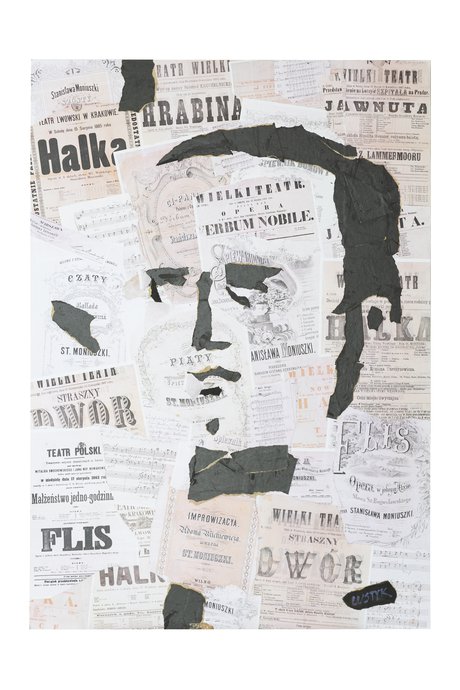
SIERPIEŃ - Moniuszko wg Bogusława Lustyka
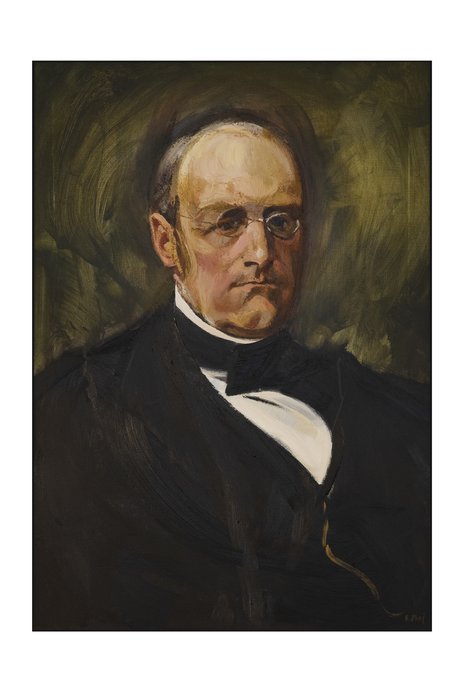
WRZESIEŃ - Moniuszko według Stanisława Baja
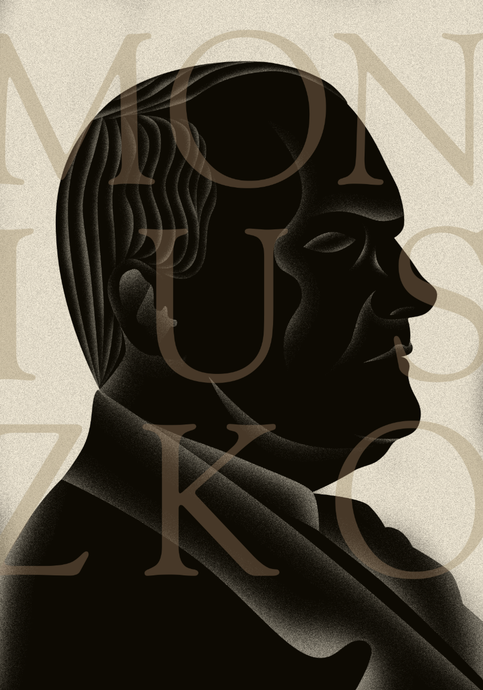
PAŹDZIERNIK - Moniuszko wg Patryka Mogilnickiego

LISTOPAD - Moniuszko wg Łodzi Kaliskiej
